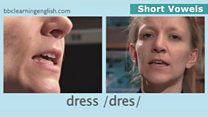Unit 24: Towards Advanced
Grammar, news, vocabulary and pronunciation
Select a unit
- 1 Towards advanced
- 2 Towards advanced
- 3 Towards advanced
- 4 Towards advanced
- 5 Towards advanced
- 6 Towards advanced
- 7 Towards advanced
- 8 Towards advanced
- 9 Towards Advanced
- 10 Towards Advanced
- 11 Towards Advanced
- 12 Towards Advanced
- 13 Towards Advanced
- 14 Towards Advanced
- 15 Towards Advanced
- 16 Towards Advanced
- 17 Towards Advanced
- 18 Towards Advanced
- 19 Towards Advanced
- 20 Towards Advanced
- 21 Towards Advanced
- 22 Towards Advanced
- 23 Towards Advanced
- 24 Towards Advanced
- 25 Towards Advanced
- 26 Towards Advanced
- 27 Towards Advanced
- 28 Towards Advanced
- 29 Towards Advanced
- 30 Towards Advanced
Session 5
Tim's Pronunciation Workshop: would you...?
How the phrase 'would you...?' is pronounced in natural English
Activity 1
Tim's Pronunciation Workshop: Would you...?
Would you do me a favour?
Tim's in the pronunciation workshop. This time he's finding out what happens when one word ends in /d/ and the next begins in /j/ - and he's asking the people of London how they ask for a helping hand...
To do
Take a look at the video, then try the activity to do some practice.
Watch the video and complete the activity

Tim
Hi. I'm Tim and this is my Pronunciation workshop. Here I'm going to show you how English is really spoken. Come on. Let’s go inside. How do you ask for help? And what is the connection between this… and this? Well, this is a piece of what? And what is the female version of this animal called? Put them together and what do you get? Well, here’s how some people in London ask for help.
Voxpops
Would you do me a favour?
Would you do me a favour?
Would you do me a favour?
Would you do me a favour?
Would you do me a favour?
Tim
Wood. Ewe. Would you – get it? Now, the words ‘ewe’ and ‘you’ have the same pronunciation, don’t they? But what happens to the word ‘you’ when it comes after the sound /d/? Watch and listen again
Voxpops
Would you do me a favour?
Would you do me a favour?
Would you do me a favour?
Would you do me a favour?
Would you do me a favour?
Tim
In fluent speech when one word ends in a /d/ sound and the next word begins in a /j/ sound, the two sounds come together and change to a /ʤ/ sound. You also might have noticed that the /uː/ in 'you' can change to schwa. So 'would you' becomes 'woul/ʤ/ou', or even ‘woul/ʤə/’ This is an example of assimilation. Here are some more examples.
Examples
I’m sad you decided to quit.
Could you get here by midnight?
Should you see him, can you give him a message?
I don’t think the gold you bought was real.
Tim
Right, so you've heard the examples. What do we do? Listen and repeat.
Examples
I’m sad you decided to quit.
Could you get here by midnight?
Should you see him, can you give him a message?
I don’t think the gold you bought was real.
Tim
Well done. And remember, if you want to learn more about pronunciation, then please visit our website, bbclearningenglish.com. And that is about it from the pronunciation workshop for this week. I'll see you soon. Bye bye! Right, now, what am I going to do with you? Ha ha – what am I going do with ‘ewe’, get it? Oh come on, would you give a guy a break?! She gets it.
To do
So that's a look at assimilation of /d/ and /j/ in natural spoken English. Now try this activity to get some more practice.
The assimilation of /d/ and /j/ game
6 Questions
How many examples of /d/ followed by /j/ coming together and changing to /ʤ/ are there in each sentence? You decide...
Help
Activity
How many examples of /d/ followed by /j/ coming together and changing to /ʤ/ are there in each sentence? You decide...
Hint
In fluent everyday speech when a word ends in a /d/ and the next word begins with /j/, the two sounds come together and change to /ʤ/.Question 1 of 6

Help
Activity
How many examples of /d/ followed by /j/ coming together and changing to /ʤ/ are there in each sentence? You decide...
Hint
In fluent everyday speech when a word ends in a /d/ and the next word begins with /j/, the two sounds come together and change to /ʤ/.Question 2 of 6

Help
Activity
How many examples of /d/ followed by /j/ coming together and changing to /ʤ/ are there in each sentence? You decide...
Hint
In fluent everyday speech when a word ends in a /d/ and the next word begins with /j/, the two sounds come together and change to /ʤ/.Question 3 of 6

Help
Activity
How many examples of /d/ followed by /j/ coming together and changing to /ʤ/ are there in each sentence? You decide...
Hint
In fluent everyday speech when a word ends in a /d/ and the next word begins with /j/, the two sounds come together and change to /ʤ/.Question 4 of 6

Help
Activity
How many examples of /d/ followed by /j/ coming together and changing to /ʤ/ are there in each sentence? You decide...
Hint
In fluent everyday speech when a word ends in a /d/ and the next word begins with /j/, the two sounds come together and change to /ʤ/.Question 5 of 6

Help
Activity
How many examples of /d/ followed by /j/ coming together and changing to /ʤ/ are there in each sentence? You decide...
Hint
In fluent everyday speech when a word ends in a /d/ and the next word begins with /j/, the two sounds come together and change to /ʤ/.Question 6 of 6

Excellent! Great job! Bad luck! You scored:
End of Unit 24
We hope that was useful. In Unit 25, Dan is going to invert himself to help you learn inversion. In News Review and LingoHack you can find out which words are making the headlines - and Tim will be back with the pronunciation workshop as usual. See you there!
Session Vocabulary
Assimilation of /d/ and /j/
When a word ends in a /d/ and the next word begins with /j/, the two sounds often come together and change to /ʤ/.
- Would you do me a favour?
- Has it been painted yet?
The /uː/ sound in you can be pronounced as schwa.
- Would you like a cup of tea?


